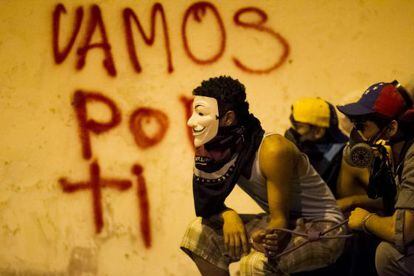Death toll climbs from anti-government protests in Venezuela
Opposition leader rejects meeting with Maduro during a government council meeting

The two-week old anti-government protests in Venezuela claimed two more lives on Monday while at the same time a major opposition leader canceled his plans to meet with President Nicolás Maduro during a high-level meeting with state governors and city mayors.
Students beefed up their efforts in setting up street and road barricades in middle-class neighborhoods across Caracas and other cities in Venezuela while reports continued to surface about National Guard troops and motorcycle gangs loyal to the government shooting at groups of unarmed protestors.
The official death toll stands at 14 with more than 140 people injured, said Attorney General Luisa Ortega Díaz.
In San Cristóbal, Táchira state – where the protests were spawned earlier this month – a 34-year-old protestor died in a hail of gunfire that came from the National Guard, witnesses said. The government has refuted this claim.
One of the latest victims was a native of the Canary Islands, a Spanish news agency reports
Almost at the same time, businessman Wilmer Carballo was shot dead by an unknown group of gunmen in Cagua, Aragua state. Witnesses said that his murderers were pro-government paramilitaries. Europa Press has reported that Carballo was a native of the Canary Islands.
Ortega Díaz, the attorney general, said that three police officers have been arrested over the shooting deaths of the first two fatalities from the nationwide anti-government protests held on February 12, including that of 19-year-old student, which was captured on video by several onlookers and published by the Caracas daily Últimas Noticias. The newspaper claimed that members of the government intelligence service Sebin were involved.
The attorney general said that four other suspects are being sought out for Díaz’s murder.
Figures on the number of people who have been arrested are also being disputed. The official number is just over 300 but the opposition claims that at least 634 persons are in custody.
Police have not given out any official numbers concerning arrests, which has frustrated human rights groups trying to determine whether the constitutional guarantees of all individuals are being respected. Rights organizations have had to rely on information posted on the social networks by family members and those who have information where those detained have been taken.
Maduro wants investigatigation into “crimes by fascists”
The National Assembly was expected to meet on Tuesday following Maduro’s call to empanel “a truth commission” to investigate “crimes committed by the fascists,” as he frequently refers to the opposition.
The embattled president, whose 10-month-old government has been struggling with soaring crime, food shortages and skyrocketing inflation, made the call as he received at Miraflores presidential palace a delegation of motorcycle riders who organized a “a great rally for life and peace” across the capital. In Venezuela, riders – known as motorizados – have traditionally been linked to the working class. But since the late President Hugo Chávez came to power in 1998, they have been closely associated with the political backbone of Chavism.
Recently, however, their members have also been blamed for the number of assaults and armed attacks on student protestors and the opposition. Figures from forensic investigators show that in Venezuela – one of the most dangerous countries in the world – a majority of murders are committed by people on motorbikes.
Despite the growing political and social tensions, Maduro has tried to play down the current wave of protests and paint a festive atmosphere in Venezuela, where the long Carnival weekend is just about to begin. During the motorcycle rally at Miraflores, he danced a few steps with his wife, first lady Cilia Flores.
Meanwhile, opposition leader and Miranda state governor Henrique Capriles, who barely lost last April’s election by 1.59 percent of the vote, canceled his plans to attend a previously called meeting by Maduro of the Federal Government Council.
"I am not going to make Nicolás Maduro look good; that is what they want, that I go there as if the country was absolutely normal," he said. “His is a dying government.”
Capriles also explained that he would not participate while another opposition leader, Leopoldo López, remains jailed along with dozens of others who have taken part in anti-government protests.
I am not going to make Nicolás Maduro look good,” says Capriles
López, a 42-year-old Harvard graduate and former mayor of the affluent Caracas district of Chacao, is being held at a military prison outside the capital following his arrest in front of his supporters at a rally on February 18 on sedition and vandalism charges related to the nationwide protests. His wife Lilian Tintori and his 69-year-old father, Leopoldo, told Reuters that the opposition leader is in good spirits despite being held in solitary confinement in a three-by-two-meter cell.
Capriles has not said whether he will attend Wednesday’s “peace conference” called by Maduro to discuss resolving the social unrest. “Miraflores Palace isn’t a place to make peace; it is a place where repression is ordered every day,” he said.
The Venezuelan media union SNTP reported that the number of assaults on journalists covering the events in the country has also soared to 62. Tim Pool, a correspondent for Vice.com, had to leave the country on Sunday after receiving a death threat.
Maduro also threatened to revoke the press credentials of CNN en Español and CNN International if it did not correct earlier stories which described the country on the verge of a civil war. He went back on his threats but continued to criticize the Atlanta-based news network’s coverage.
The president also accused the opposition of receiving support from abroad. To back his claims, he announced the arrest of a 34-year-old “Arab mercenary” in Maracay, the capital of Aragua state, who reportedly had communications equipment and explosives coming from the United States and Colombia.










































